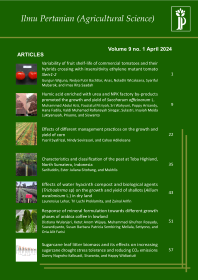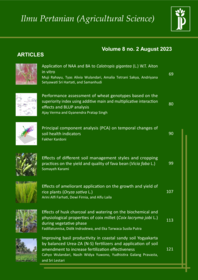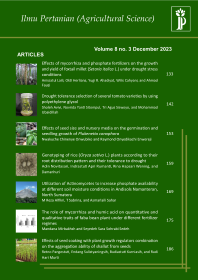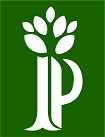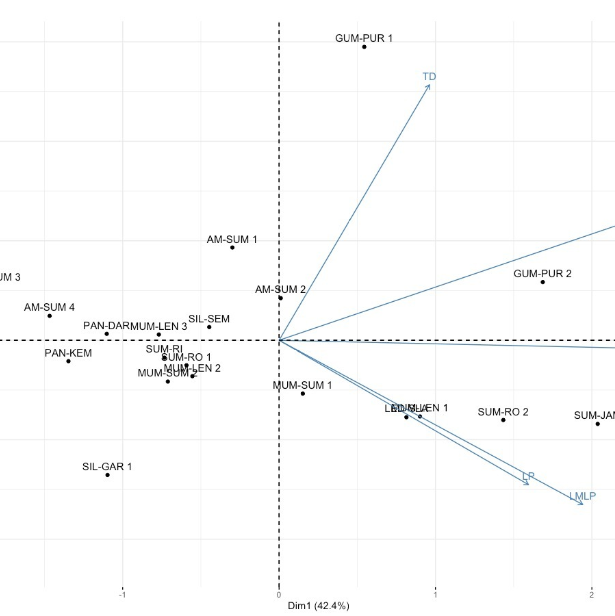
Morphological characterization of papaya accessions in Jember through multivariate analysis
Riza Yuli Rusdiana(1*), Halimatus Sa'diyah(2), Vega Kartika Sari(3), Kacung Hariyono(4), Sri Hartatik(5)
(1) Department of Agronomy, Faculty of Agriculture, Universitas Jember Jl. Kalimantan 37, Jember, East Java, Indonesia 68121
(2) Department of Agronomy, Faculty of Agriculture, Universitas Jember Jl. Kalimantan 37, Jember, East Java, Indonesia 68121
(3) Department of Agronomy, Faculty of Agriculture, Universitas Jember Jl. Kalimantan 37, Jember, East Java, Indonesia 68121
(4) Department of Agronomy, Faculty of Agriculture, Universitas Jember Jl. Kalimantan 37, Jember, East Java, Indonesia 68121
(5) Department of Agronomy, Faculty of Agriculture, Universitas Jember Jl. Kalimantan 37, Jember, East Java, Indonesia 68121
(*) Corresponding Author
Abstract
This study aimed to select the most informative morphological descriptors in characterizing and distinguishing papaya accessions in Jember. The multivariate analysis was used to i) determine the closeness between the papaya accessions collected based on morphology descriptors and ii) define a list of sufficient minimum descriptors to distinguish papaya accessions in Jember. Five quantitative and fifteen qualitative descriptors were used in evaluating 23 accessions. The data collected through quantitative descriptors were analyzed by the means of PCAbiplot analysis and qualitative descriptors were analyzed using entropy level. Statistical analysis was carried out by R studio software using two packages, i.e. biotools and factoextra packages. Based on the research results, the first two principal components of the PCAbiplot representation of 23 accessions were able to evaluate 67.18% of the total variability. The accessions located in KALSUK, GUMPUR 1, and GUMPUR 2 had similarities in tree diameter and width of mature leaf characters, while KALPLA, MUMSUM 1, LEDSLA, MUMLEN 1, SUMRO 2, and SUMJAM accessions shared similarities in the length of mature leaf, petiole, and peduncle. The minimum descriptors that could be used to characterize papaya plant accessions in Jember were two quantitative descriptors (tree diameter and length of mature leaf) and three qualitative descriptors (general shape of mature leaf teeth, height to first fruit, and stem color). The combination of quantitativequalitative descriptors allowed the simple and rapid characterization of papaya accession. In addition, it could reduce costs and labor without losing information in the characterization of papaya plants.
Keywords
Full Text:
PDFReferences
Afonso, S.D.J., Ledo, C.D.S., Moreira, R.F.C., Silva, S.O., Leal, V.D.J., and Conceição, A.L.S. (2014). Selection of descriptors in morphological characteristics considered in cassava accessions by means of multivariate techniques. Journal of Agriculture and veterinary Science, 7(1), pp. 13–20.
Ariefianto, L. and Ulum, M.B. (2019). Papaya innovation training for women retired migrant workers in Sabrang village, Ambulu district, Jember regency. Warta Pengabdian, 13(4), pp. 136–146.
BPS. (2021). Jember regency in figures 2021. Jember: BPS.
da Silva, H.K., Passos, A.R., Schnadelbach, A.S., Moreira, R.F.C., Conceição, A.L.S., and Lima, A.P. (2019). Selection of morphoagronomic descriptors in Physalis angulate L. using multivariate techniques. Journal of Agricultural Science, 11(1), pp. 289–302.
de Oliveira, E.J., Dias, N.L.P., and Dantas, J.L.L. (2012). Selection of morpho-agronomic descriptors for characterization of papaya cultivars. Euphytica, 185(2), pp. 253–265.
de Oliveira, T.R.A., Gravina, G.A., de Oliveira, G.H.F., de Araujo, L.C., Araújo, K.C., da Cruz, D.P., Junior, T.D., Vivas, M., and Daher, R.F. (2018). Multivariate analysis used as a tool to select snap been (Phaseolus vulgaris L.) genotypes. Australian Journal of Crop Science, 12(1), pp. 67–73.
Dewi, Y.S. and Nonik, A. (2015). Biplot analysis to describe characteristics of districts in Jember. Majalah Ilmiah Matematika dan Statistika, 15(2), pp. 75–86.
Emede, T.O., Ajayo, B.S., and Agho, C. (2017). Genetics diversity and variability among papaya (Carica papaya L.) genotypes using multivariate analysis. International Journal of Plant and Soil Science, 15(2), pp 1–9.
Fatria, D., Budiyanti., T., Noflindawati, Sunyoto and Husada, E.D. (2019). Evaluation of the morphological and quality characteristics of new varieties of Papaya Agri Solinda. IOP Conf. Series: Earth and Environmental Sciences, 497, pp. 1–7.
Febjislami, S., Suketi, K., and Yunianti, R. (2018). Morphological characterization of flowers, fruit and fruit quality three genotypes of hybrid papaya. Bul. Agrohorti, 6(1), pp. 112–119.
Gao, X., Shi, L., and Wu, Z. (2015). Cluster analysis of Pinus tawainensis for its ex situ conservation in China. Genet. Mol. Res, 14(2), pp. 5845–5855.
Hariyono, K., Sari, V. K., Rusdiana, R. Y., Fariroh, I., Putri, W. K., Restanto, D. P., and Noviana, L. (2022). Inventarisasi dan Identifikasi Morfologi Tanaman Garut (Maranta arundinaceus L.) di Kabupaten Jember. Jurnal Penelitian Pertanian Terapan, 22(3), pp. 238–246.
Hijmans, R., Guarino, L., and Mathur, P. (2012). DIVA-GIS Version 7.5 Manual. [online] Available at http://www.diva-gis.org/docs/DIVA-GIS_ manual_7.pdf [Accesed 21 January 2021].
IBPGR. (1988). Descriptors for papaya. Rome: International Board for Plant Genetic Resources.
Jolliffe, I.T., and Cadima, J. (2016). Principal component analysis: a review and recent development. Phil. Trans. R. Soc., 374(2065), pp. 1–16.
Komarayanti, S. (2017). Encyclopedia of local fuits based natural potential Jember. Jurnal Biologi dan Pembelajaran Biologi, 2(1), pp. 61–75.
Karuniawan, A., Wicaksono, H.N., Ustari, D., Setiawati, T., and Supriatun, T. (2017). Identification of genetics diversity of wild cassava (Manihot glaziovii muell) germplasm based on morpho-agronomy traits. Jurnal Kultivasi, 16(3), pp. 435–443.
Magdalita, P.M., Noel, M.R., Aguilar, E.A., and San Pascual, A.O. (2021). Morphological characters of papaya (Carica papaya L.) for drought tolerance. Science Diliman, 33(2), pp. 53–69.
Marcon, E., Scotti, I., Hérault, B., Rossi, V., and Lang, G. (2014). Generalization of the partitioning of Shannon diversity. PloS One, 9(3), pp. e90289.
Nishimwe, G., Kosgei, J.C., Okoth, E.M., Asudi, G.O., and Rimberia, F.K. (2019). Evaluation of the morphological and quality characteristics of new papaya hybrid lines in Kenya. African Journal of Biotechnology, 18(2), pp. 58–67.
Rencher, A.C. (2002). Methods of multivariate analysis. Canada: John Wiley & Sons, Inc.
Sadiyah, H., Soegianto, A., Waluyo, B., and Ashari, S. (2020). Short communication: preliminary characterization of groundcherry (Physalis angulate) from East Java Province, Indonesia based on morphoagronomic traits. Biodiversitas Journal of Biological Diversity, 21(2), pp. 759–769.
Sadiyah, H., Ashari, S., Waluyo, B., and Soegianto, A. (2021). Genetic diversity and relationship of husk tomato (Physalis spp.) from East Java Province revealed by SSR markers. Biodiversitas Journal of Biological Diversity, 22(1), pp. 184–192.
Silva, R.S., Moura, E.F., Farias-Neto, J.T., Ledo, C.A.S., and Sampaio, J.E. (2017). Selection of morphoagronomic descriptors for the characterization of accessions of cassava of the Eastern Brazilian Amazon. Genetics and Molecular Research, 16(2), pp. 1–11.
Sudré, C.P., Gonçalves, L.S.A., Rodrigues, R., do Amaral Júnior, A.T., Riva-Souza, E.M., and Bento, C. dos S. (2010). Genetic variability in domesticated Capsicum spp. as assessed by morphological and agronomic data in mixed statistical analysis. Genetics and Molecular Research, 9(1), pp. 283–294.
Sunyoto, S., Octriana, L., Fatria, D., Hendri, H., and Kuswandi, K. (2015). Evaluation of growth and yield of some papaya hybrids in the development area Bogor. Jurnal Hortikultura, 25(3), pp. 193–200.
Zhang, Y., Xiong, Y., Liu, Y., and Huang, X. (2021). Pollen morphology analysis of papaya (Carica papaya L.). Crop Breeding and Applied Biotechnology, 21(3), pp. 1–7.
Zulfahmi, Purwanto, E., Parjanto, and Yunus, A. (2020). Phenotypic diversity and plasticity index of Eurycoma apiculate populations in Eastern Sumatra, Indonesia based on leaves morphology. Biodiversitas, 21(7), pp. 2923–2934.
Article Metrics
Refbacks
- There are currently no refbacks.
Ilmu Pertanian (Agricultural Science) ISSN 0126-4214 (print), ISSN 2527-7162 (online) is published by Faculty of Agriculture Universitas Gadjah Mada collaboration with Perhimpunan Sarjana Pertanian Indonesia (PISPI) and licensed under a Creative Commons Attribution-ShareAlike 4.0 International License.











